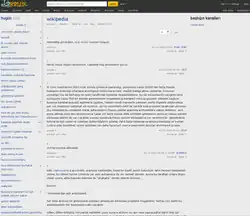Ekşi Sözlük
Ekşi Sözlük (Turkish pronunciation: [ecˈʃi sœzˈlyc]; "Sour Dictionary", stylized as ekşi sözlük) is a collaborative hypertext dictionary in Turkish based on the concept of Web sites built up on user contribution.[2] However, Ekşi Sözlük is not a dictionary in the strict sense; users are not required to write correct information. It is currently one of the largest online communities in Turkey with over 400,000 registered users.[3] The number of writers is about 110,000. As an online public sphere, Ekşi Sözlük is not only utilized by thousands for information sharing on various topics ranging from scientific subjects to everyday life issues, but also used as a virtual socio-political community to communicate disputed political contents and to share personal views.[4] The site has been blocked in Turkey since February 2023.[5]
 Screenshot of the main page as of 2013. | |
| Available in | Turkish |
|---|---|
| Owner | Ekşi Teknoloji ve Bilişim A.Ş.[1] |
| Founder(s) | Sedat Kapanoğlu (known as "ssg" in the website) |
| URL | www www |
| Commercial | Website and Mobile App |
| Registration | Required |
| Launched | 15 February 1999 |
| Current status | Active, blocked in Turkey. |
History
The website's founder is Sedat Kapanoğlu. He founded the website for communicating with his friends in 1999 as he was inspired by The Hitchhiker's Guide to the Galaxy.[6][7] Ekşi Sözlük was a part of a website called sourtimes.org which was named after the Portishead song "Sour Times" and the dictionary was named "Ekşi (Sour)" for this reason.[8]
Ekşi Sözlük has been successful, many other websites that use this concept has emerged, like İTÜ Sözlük in Turkish.[9] Turkish sociologist Zeynep Tüfekçi says it is like "Wikipedia, a social network and Reddit rolled into one".[10]
On February 21, 2023, access to the website was blocked in Turkey by the Information and Communication Technologies Authority of Turkey.[11][12] On March 2, 2023, the 4th Ankara Peace Court decided to remove the access barrier, but the decision was reversed by a higher court and it remains blocked.[5]
Rules and structure
Enrollment periods to the dictionary and the criteria of acceptance are changeable.[13] Ekşi Sözlük does not accept new authors continuously; there are specific times in which new authors are accepted. There is a waiting period for new members who want to become authors in which they must post at least 10 entries. All entries are inspected according to the dictionary rules and their quality, and if they pass inspection, the new user becomes an author. However, this process might take from months to years.
Titles are limited to 50 characters in length. Entries have no length limit.
Newcomer, Newcomer awaiting approval, Registered reader, Praetors, and Hacıvat are some of the user roles in Ekşi Sözlük.[13]
Since there are no restrictions on entries, moderators and informers are responsible for catching and deleting any inappropriate entry. Informers are usually the older generation authors who voluntarily report any bad content to moderators for examination. If the moderators find the entries inappropriate, they are deleted.
Site statistics[14] are updated on a daily basis. There are 300 to 400 posts on average for each author. More than half of the authors are at the age of 18–25 and the number of male users is two times more than that of female ones.
No capital letters are allowed in the posts.[15] This prevents all-caps shouting.
Mobile application
An official application for Ekşi Sözlük has been released in 2017 for iOS and Android platforms.[16]
See also
References
- "ekşi sözlük kullanım koşulları". ekşi sözlük (in Turkish). Retrieved 30 May 2020.
- "Ekşi Sözlük: a Turkish Internet phenomenon". Turkish Daily News. Retrieved 27 June 2007.
- "Stats" (in Turkish). Ek$i Sözlük. Retrieved 23 June 2010.
- Hatice Akca (2005). The Internet as a participatory medium: An analysis of the Eksi Sozluk website as a public sphere (M.A. dissertation thesis). University of South Carolina. ProQuest 746773010.
- "Turkish court once again blocks access to popular social network Ekşi Sözlük". Gazete Duvar. 3 February 2023. Retrieved 4 March 2023.
- Buyukdemir, Burak (9 November 2010). "6 Kasım Etohum Kampı Ankara - Sedat Kapanoğlu - Eksisozluk.com" – via Vimeo.
- "Ekşisözlük adı nereden çıktı? - Etohum". Archived from the original on 12 January 2014. Retrieved 12 January 2014.
- "General Introduction and Roots of Ekşi Sözlük". 解析新書 Table Anatomy. 13 May 2020. Archived from the original on 13 July 2020. Retrieved 7 February 2021.
- "Katılımcı Sözlükler (Ekşi Sözlük, İtü Sözlük, Uludağ Sözlük v.b) - Caner Erden". Archived from the original on 16 January 2017. Retrieved 14 January 2017.
- Kantrowitz, Alex (10 July 2013). "How The Founder of Turkey's Original Social Network Explained It To His Microsoft Co-Workers". Forbes.
- "BTK'den Ekşi Sözlük engeli!" (in Turkish). Cumhuriyet.com.tr. 21 February 2023. Retrieved 21 February 2023.
- "Ekşi Sözlük hakkında erişimin engellenmesi kararı" (in Turkish). Gazete Duvar. 21 February 2023. Retrieved 21 February 2023.
- "Archived copy" (PDF). Archived from the original (PDF) on 7 April 2012. Retrieved 8 November 2011.
{{cite web}}: CS1 maint: archived copy as title (link) - "istatistikler - ekşi sözlük".
- Trivially verifiable by looking at any post at the website at eksisozluk
.com - "Ekşi Sözlük'ün kendi uygulaması yayınlandı! - Teknoloji Haberleri". 22 July 2017. Archived from the original on 22 July 2017. Retrieved 28 January 2020.